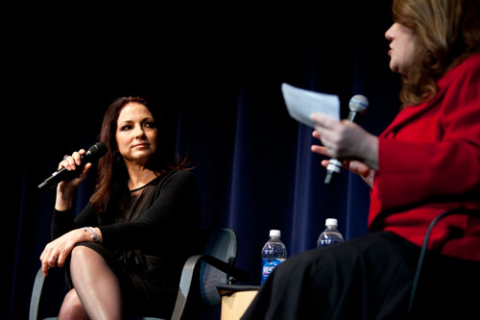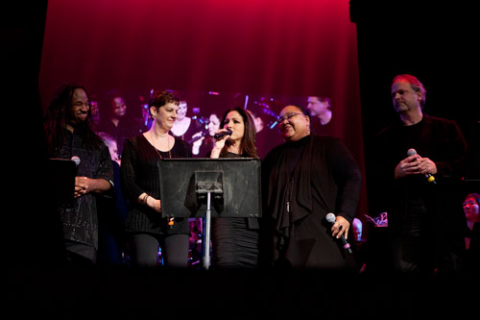Gloria Estefan: Inspiring the Self-Teacher

Gloria Estefan talks on the conference's theme: inspiring the self-teacher.
Photo by Kelly Davidson

Music business/management professor Andrea Johnson interviews Estefan.
Photo by Kelly Davidson

Estefan joins a faculty band performing her hit songs.
Photo by Kelly Davidson

"The Queen of Latin Pop" performs at the BPC.
Photo by Kelly Davidson
Singer-songwriter and seven-time Grammy winner Gloria Estefan has always had an innate curiosity for music, but she credits the teachers in her life with pushing her to explore her talents further.
The keynote speaker for this year's Berklee Teachers on Teaching (BTOT) faculty development conference, the "Latin Queen of Pop" spoke to the theme of inspiring the self-teacher, which is, in her view, critical to making meaningful connections with students and putting them on a path to lifelong learning.
"I think any teacher worth his salt has got to inspire self-teaching," said Estefan, whose professional musical beginnings trace back to days with the Miami Latin Boys, renamed Miami Sound Machine and led by her now-husband Emilio Estefan. The Estefans received honorary doctorates from Berklee in 2007. She went on, "Unless you're someone who happens to know everything about everything or you're going to spend every waking moment with your student or your child, it's imperative that you teach them to self-teach."
Over two days of BTOT workshops, presented by the Office of Faculty Development, faculty members shared with their colleagues insight and expertise on topics apropos to the theme, culminating with the keynote address at the Berklee Performance Center. Past BTOT keynote speakers included Ornette Coleman, Paquito D'Rivera, Marian McPartland, and Pandit Ravi Shankar.
For Estefan, her own self-teaching has led to great success. With 90 million albums sold worldwide, she has earned international acclaim as a musician as well as recognition for her humanitarian efforts.
Since childhood, Estefan was inquisitive. Her parents would address her questions but also guide her to find her own answers.
"It's always nice to give answers, but it's much better when you inspire someone to go searching for them, because that I think is going to lead to a lifetime of teaching rather than [just] the moments you have them," she said.
Estefan knows firsthand the value of this lesson, noting that the circumstances in her early life "created fertile ground to do exactly that: inspire the self-teacher in me."
Born in Havana, Cuba, Estefan's family fled for Miami when she was 18 months old. Her grandmother used to smuggle Cuban records to the U.S. in boxes of Gerber baby food.
When she moved with her family to San Antonio, Texas at the age of 5, she spoke no English, but her natural love for music had deepened. Her first teacher tapped into that love to help her learn English. "She said, 'I want you to turn on the radio whenever you have a chance and listen. Just listen to the things that you love, because that is going to be the best teacher of English for you,'" Estefan recounted. She soaked up the lyrics, and six months later earned a reading award. "She had somehow pointed me in the right direction and showed me how I could fill in those gaps that she couldn't fill in on her own, because she simply didn't have the time."
"She changed my life," Estefan said of her teacher. "She taught me how to teach myself."
Music continued to play a prominent role in Estefan's life, and served as a vehicle for self-discovery. Seduced by the magic of singer-songwriters, she learned from listening over and over again to the music of such artists as Stevie Wonder, Carole King, Elton John and Bernie Taupin, and James Taylor. "They became my teachers," she said. "They were speaking to me, . . . giving me examples and ideas of how to put my emotions into words."
To Berklee's faculty members, she said, "stay in the game" and continue to perform.
"Teachers, you have students in your life for a certain amount of time," she said. "If you do it the right way, you will be with them forever."
Following Estefan's speech, music business/management professor Andrea Johnson interviewed Estefan about the songwriting process, connecting with the audience, diversifying as an artist, and being entrepreneurial.
The afternoon concluded with a faculty tribute band performing Estefan's hit "The Rhythm Is Gonna Get You" and "Turn the Beat Around," a disco cover for which she's famous. Estefan joined the band for a rendition of her ballad "Here We Are" and what she called her first Spanglish song and a call to social consciousness, "Oye Mi Canto."
